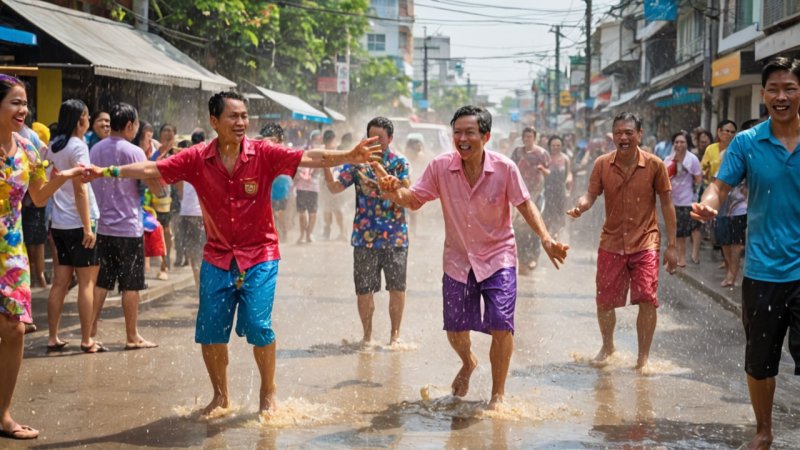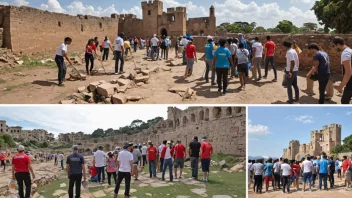Every year in mid-April, Thailand transforms into a vibrant tapestry of water, laughter, and cultural pride as it celebrates Songkran, the Thai New Year. This festival is not just a unique way of ringing in the new year; it embodies the rich heritage, traditions, and communal spirit of the Thai people. From the symbolic cleansing rituals to the lively street parties, Songkran offers visitors an unforgettable experience that showcases the heart and soul of Thailand.
Historical Significance of Songkran
Songkran has its roots in ancient traditions and is steeped in history. The term 'Songkran' is derived from the Sanskrit word 'saṃkrānti,' which means 'to move' or 'to change.' Traditionally, this festival marks the transition of the sun into the Aries zodiac sign, indicating the start of the new solar year.
Originally, Songkran was celebrated as a time for family reunions, honoring ancestors, and paying respect to Buddhist monks. The act of pouring water over Buddha statues, as well as over the hands of elders, symbolizes purification and the washing away of misfortunes. This year, the festival has evolved into a nationwide celebration filled with joy, music, and a sense of community.
When and Where to Celebrate Songkran
Songkran is celebrated over three days, typically from April 13 to April 15, but festivities can extend throughout the week in some areas. Each region in Thailand has its own unique way of celebrating, and while the central event is the water fights, local customs and traditions shine through.
- Bangkok: The capital city hosts some of the largest and most energetic celebrations, particularly in areas like Khao San Road and Silom. Expect massive water battles, street parties, and live music.
- Chiang Mai: Known for its traditional ceremonies, Chiang Mai's Songkran includes colorful parades, religious processions, and the famous water fights in the Old City. The atmosphere is both festive and spiritual.
- Pattaya: Renowned for its vibrant nightlife, Pattaya celebrates Songkran with epic beach parties, live entertainment, and all-day water fights along the beachfront.
- Ayutthaya: As a UNESCO World Heritage site, Ayutthaya offers a more traditional experience, where you can witness ancient temples during the water festivities, reflecting the cultural heritage of Thailand.
The Rituals and Traditions of Songkran
While water fights are the highlight of Songkran, there are several important rituals and traditions that are integral to the celebration.
1. Water Pouring Ritual
The core of Songkran revolves around the ritual of pouring water. Families will pour scented water over Buddha statues in their homes and temples, seeking blessings for the upcoming year. This ritual is often accompanied by the chanting of prayers and offerings of food to the monks.
2. Sand Pagoda Building
In many regions, participants build sand pagodas at temples, which they decorate with flowers and flags. This practice symbolizes the return of sand that has been carried away on shoes throughout the year, and it represents merit-making and gratitude to the Buddha.
3. Paying Respect to Elders
Songkran is also a time for family gatherings, where younger generations pay respect to their elders. This is often done by pouring water over their hands as a sign of reverence and asking for blessings for the new year.
4. Street Parties and Water Fights
The most famous aspect of Songkran is the exhilarating street parties and water fights. Participants take to the streets armed with water guns, buckets, and hoses, engaging in friendly battles that can last for hours. The atmosphere is electric, filled with laughter, music, and the joy of community.
Travel Tips for Experiencing Songkran
To make the most of your Songkran experience, consider the following tips:
- Stay Hydrated: With all the excitement and physical activity, it's crucial to drink plenty of water to stay hydrated.
- Wear Appropriate Clothing: Opt for light, quick-drying clothes. Many participants wear traditional Thai clothing or fun, colorful attire.
- Protect Your Electronics: Keep your phone and other valuables in waterproof bags or pouches to avoid damage from water.
- Be Mindful of Local Customs: While Songkran is a fun celebration, be respectful of traditional rituals and customs, especially in temples and during religious ceremonies.
- Plan Your Travel: Accommodations can fill up quickly during Songkran, so make sure to book in advance. Consider arriving a few days early to experience local preparations.
Unique Experiences During Songkran
Beyond the water fights, Songkran offers unique experiences that visitors should not miss:
1. Traditional Thai Dance Performances
Throughout the festival, many locations host traditional Thai dance performances, showcasing the country's rich cultural heritage. These performances often tell stories of Thai folklore and history.
2. Food Festivals
Songkran is a great time to indulge in delicious Thai cuisine. Street vendors and local eateries will offer special Songkran dishes, including fresh seafood, mango sticky rice, and spicy salads.
3. Visit Temples
Take time to visit some of Thailand's beautiful temples during Songkran. Witnessing the rituals and ceremonies can provide a deeper understanding of the cultural significance of the festival.
4. Participate in Local Events
Many towns and cities hold unique events during Songkran, such as beauty contests, parades, and traditional games. Engaging in these activities can provide an authentic experience of local culture.
Conclusion
Songkran is much more than a festival; it is a celebration of life, community, and cultural heritage. As you immerse yourself in the vibrant festivities, from the water fights to the rituals, you will find that this unique experience fosters a sense of unity and joy among both locals and visitors. Whether you choose to participate in the exhilarating street battles or observe the solemn rituals, Songkran promises to leave you with cherished memories and a deeper appreciation for Thailand's rich culture.






